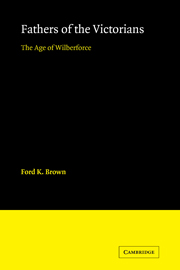Book contents
- Frontmatter
- Contents
- Dedication
- Foreword
- PART I WAR ON THE GENTILE WORLD
- PART II LABOURING FOR THE SPIRITUAL IMPROVEMENT OF OTHERS
- 6 Gangrening the Principles of the Country
- 7 Missionaries to England
- 8 The Crisis at Cambridge
- 9 Ten Thousand Compassions and Charities
- PART III ENGLAND IN DANGER
- Bibliography
- Index
9 - Ten Thousand Compassions and Charities
Published online by Cambridge University Press: 11 March 2010
- Frontmatter
- Contents
- Dedication
- Foreword
- PART I WAR ON THE GENTILE WORLD
- PART II LABOURING FOR THE SPIRITUAL IMPROVEMENT OF OTHERS
- 6 Gangrening the Principles of the Country
- 7 Missionaries to England
- 8 The Crisis at Cambridge
- 9 Ten Thousand Compassions and Charities
- PART III ENGLAND IN DANGER
- Bibliography
- Index
Summary
Ours is the age of societies. For the redress of every oppression that is done tinder the sun, there is a public meeting. For the cure of every sorrow by which our land or our race can be visited, there are patrons, vice-presidents and secretaries. For the diffusion of every blessing of which mankind can partake in common, there is a committee. That confederacy which, when pent up within the narrow limits of Clapham, jocose men invidiously called a ‘Sect’, is now spreading through the habitable globe.
sir james stephenWhat soldier ever serveth at his own charge? who planteth a vineyard, and eateth not the fruit thereof? or who feedeth a flock, and eateth not of the milk of the flock?… Even so did the Lord ordain that they which proclaim the gospel should live of the gospel.
i corinthiansThe dimensions of the Bible and Missionary Societies were not reached again by any religious or benevolent society of this age. But from beginning to end of it moral, religious, educational, charitable and benevolent institutions sprang up in an unheard-of way, many of them branching out through the provinces, all of them ‘useful’ in one degree or another and many spectacularly so. It seemed to some observers watching them with amusement or wonder, perhaps also uneasiness, that they left no field of social activity untouched. ‘This is the age of societies’, the young Thomas Babington Macaulay wrote in 1823.
- Type
- Chapter
- Information
- Fathers of the VictoriansThe Age of Wilberforce, pp. 317 - 360Publisher: Cambridge University PressPrint publication year: 1961
- 1
- Cited by



